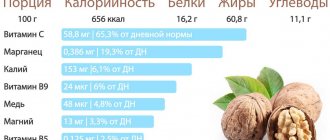Author: Timko Ilya - the ruler of the entire site and fitness trainer | more details >> Rod. 1984 Trained since 1999 Trained since 2007. Author and creator of the site tvoytrener.com. CCM in powerlifting. Champion of Russia and South Russia according to AWPC. Champion of the Krasnodar region according to IPF. 1st category in weightlifting. 2-time winner of the Krasnodar Territory championship in t/a. Author of more than 700 articles on fitness and amateur athletics. Author and co-author of 5 books.
Place in the author rating:
out of competition
(become an author) Date: 2015-10-31 Views: 38,249 Rating: 4.7
| All articles by the author >> | Medals articles >> |
Articles are loading...
I’ll say right away that by protein in this article I mean protein in general (in general), and not just protein as a sports supplement, or not just protein that is found in regular food.
So, everyone answers this question differently: 1 gram per 1 kg of body weight, 2 grams, 3 grams and even 4 grams! There have been a lot of studies, and they all also showed different results. But the difference of 1 and 4 grams is not a big difference! I will not provide any research in this article. All numbers are purely my coaching experience, which I have accumulated over 9 years of observing and training my players.
I would also like to say at the beginning that many of these experiments were sponsored by sports nutrition manufacturers. And it is beneficial for them to have more protein. After all, this will encourage you to buy more protein. Are you smart? Well, now to the point.
Amount of Protein for Weight Loss
Before you start consuming protein supplements, as well as various high-protein snack bars, you should know your own recommended protein intake. But how much protein per kg of weight does a person need to lose weight?
Any nutritional guide will tell you that a healthy adult should consume 10-35% of calories per day from protein. But is it really true that the more protein a person eats per day, the better for the body? Eating any nutrients in large quantities will not bring any benefit to the body, especially if a person wants to lose extra pounds.
Some scientists claim that consuming large quantities of protein foods during a diet significantly reduces weight. However, there is another opinion. Experts who adhere to it believe that the amount of protein consumed should be maintained only at the recommended dose. Let's look at the example of research by scientists.
How much protein should a person eat per day?
Surprisingly, according to generally accepted recommendations, the amount of protein you need to eat per day to improve your body is almost the same for different people.
For most, the ideal daily protein intake is: 1.6-3.0 g per kg of body weight.
Of course, this range is quite wide. Here are tips on how to narrow it down to what's right for you.
Recommended amount of protein per day based on baseline fitness and goals
| Man, his physical form and goals | Ideal Daily Protein Intake |
| The average healthy adult (male or female) who lives a mostly sedentary lifestyle and does little or no exercise. This is the minimum daily amount of protein to maintain overall health/function of the body. | 1,0-1,4 g protein per kg body weight. |
| The average healthy adult (male or female) who regularly engages in low-intensity exercise or is trying to improve their body (lose weight, build muscle, etc.). This is the minimum recommended amount. | 1,6-2,0 g protein per kg body weight. |
| The average healthy adult woman , whose main goal is to build muscle mass, make the muscles more prominent and “dry”, increase endurance or performance. | 2,0-2,4 g protein per kg body weight. |
| The average healthy adult male , whose main goal is to build muscle mass, make the muscles more prominent and “dry”, increase endurance or performance. | 2,0-3,0 g protein per kg body weight. |
If you're still in doubt, the generally accepted recommendation of 2g protein per kg of body weight, which has reigned in the fitness world for decades, is an average protein intake that is sufficient for most people.
So, to find out how much protein you need each day, you should multiply your current body weight (in kilograms) by the amount of protein recommended in the table above.
Here are 2 examples:
- A woman weighing 65 kg who wants to pump up muscles, make them more prominent or get rid of excess fat (while maintaining muscle mass) should multiply 65 by 2.0-2.4. The daily protein intake in her case will be about 130-156 g per day.
- A 200-pound man who wants to increase muscle size, maintain muscle while losing weight, or improve endurance/performance should multiply 90 by 2.0 to 3.0. The daily protein intake in his case will be about 180-270 g per day.
To put it even easier, multiply your current body weight in kilograms by a generally accepted figure.
This will give you a range of how much protein you should consume per day. Did you count? Amazing! Now we have figured out your daily protein requirement.
*Note*
For overweight people, the ideal amount of protein when calculated using current body weight will be higher due to excess fat. Therefore, for those who are obese, a target body weight should be used. For example, a person weighing 150 kg, wanting to lose weight to 100, should use a weight of 100 kg in calculating daily requirements.
As long as you stay within this "ideal" range, your protein intake will meet your needs, resulting in the best results possible.
The next thing you need to know is a list of foods that should be present in your diet every day.
Research
A recent study found that people who consumed 25-30% of their calories from lean, healthy protein were able to lose more fat and also significantly increased the amount of calories they burned.
During the first study, which was devoted to excess weight and obesity in women, experts assessed the condition of those women who consumed so-called high proteins (30%). And those who adhered to a dairy diet, consuming low proteins (15%).
The group of women on a high-protein diet gained lean muscle mass and lost weight faster than the group on a lower-protein diet. The second group also lost extra pounds, but the women also lost muscle mass.
Scientists have suggested that this muscle loss may have a negative impact on a person’s future condition, causing the development of a “plateau effect” during weight loss. Many people who stick to a diet suffer from such an unreasonable cessation of weight loss. Lean muscle mass burns many more calories than fat tissue, even when the human body is at rest.
When those women who ate little protein began to rapidly lose muscle mass, they also lost the ability to burn more calories during the day. On the other hand, the improved tissue composition in the human body of those people who took in large amounts of protein helped them burn more calories in a very short period of time.

It must be remembered that if you consume more calories during the day, no matter what they are, your weight will rapidly increase. But some scientific studies have proven that gaining weight by eating healthy proteins is considered much better than using carbohydrates and fats. But if the main goal is to get rid of extra pounds, then you need to consume calories in a certain amount. This is the path to success.
Now you should familiarize yourself in more detail with how many grams of protein per kilogram of weight are needed by those people who engage in physical exercise.
Amount of protein for athletes
If exercise is included in a program to burn excess weight, protein simply needs to be included in your diet. It should be noted that the need for it among athletes is much higher than among those who simply follow a diet. Those athletes who follow a diet in addition to exercise should adhere to the protein intake recommendations of 10-35%, while continuing to consume maximum protein. But what will be the amount of protein per 1 kg of weight? There is a fairly simple formula for calculating the amount of protein.
The average dieter should consume 1 gram of protein per 1 kg of weight. People who exercise vigorously should consume approximately 1.5 grams of protein per kilogram of body weight. In this case, we are talking about those people who play sports about 10 hours a week.

From the above, it becomes clear that to lose weight you should consume 1 gram of protein per 1 kg of weight. But is it necessary to use any additional supplements in this case? More on this later.
How much protein is needed for growth: research yesterday and today
Studies have shown that the human need for protein without excessive physical activity is not that great. On average, it is 0.8-1.2 grams per kilo of weight. German physiologists suggested the following:
- Max Rubner believed that the daily norm was 127 grams.
- Voith Karl is confident that 118 grams is enough.
The question of how much protein is needed per 1 kg of weight to gain muscle mass has been asked by many minds of mankind. At the same time, the standards were constantly adjusted down or up. The dosage varied from 40 to 250 grams (regardless of the load). Based on the generally accepted norm, it is 100 grams per day. This is exactly the daily portion of “building material” recommended by the Public Health Association (Public Health Association). The National Council of the United States has a different opinion. They are confident that 65 grams is enough (primarily for older people).
Despite the development of modern technologies, discussions on the question of how much protein per day is needed for muscle growth continue today. The article reveals the problem from the perspective of an athlete who trains hard and sets serious goals for himself. Most athletes take the easy route - they multiply the weight by the number “2”. The result obtained is the amount of protein needed to gain muscle mass. For example, if a man weighs 100 kilograms, then his diet should contain 200 grams of protein.
Another category of athletes has a different opinion. Thus, sports magazines claim that the amount of protein per day for muscle growth should be greater, but the proposed two grams per kilo is not enough. This is explained by the fact that an athlete’s need for protein is higher, and therefore it is advisable to take it at double or even triple the rate.

In contrast to the theory mentioned above, it is worth remembering the recommendations of the World Health Organization. In this structure, a different norm was established - 0.75 grams per kilogram of mass. As for the medical literature, they are absolutely frightening about problems in the body if the protein norm is exceeded. If the dosage is more than three grams/kilo, then problems with the liver, kidneys and other organs cannot be avoided.
So how much protein is needed for muscle growth without harming the body? The issue of side effects and contraindications has been discussed in thousands of articles. But practice shows that for the most part, “horror stories” are nothing more than speculation. Problems are possible only with individual intolerance or excessive enthusiasm for taking it, when the body does not have time to eliminate the excess norm. A person in good health has nothing to fear.
Scientists have proven that the body needs pure protein not only for muscle growth, but also for nourishing organs and systems. This means that the norm of this substance for a person with a normal schedule and the dosage for an athlete will be different. In the process of calculating how much protein is needed per 1 kg of weight, it is worth taking into account the needs of the muscles and the body itself.
People are confused by the fact that numerous health organizations impose calculated standards and assure that they do not need to take more than 1 gram per kilogram. For athletes, the proposed dosage is only a starting point that helps make calculations. In other words, this is the minimum bar beyond which it is prohibited to go.

Use of other supplements
Most protein supplements are quite expensive, and some contain sugar and other unwanted substances. But why waste your money while consuming extra calories? Experienced trainers say that when getting rid of excess weight, it is best to avoid any protein supplements.
If the diet contains healthy food that contains proteins, this will be quite enough to satisfy the needs of the human body. In this case, 1 gram of protein per 1 kg of weight is also consumed. However, to do this you need to know which foods and in what quantity contain protein. Not everyone knows that products present on almost every table can provide a person with the necessary amount of proteins.
As mentioned earlier, 1 gram of protein per 1 kg of weight will be quite enough for those people who exercise and adhere to a diet. We suggest that you familiarize yourself in more detail with the amount of protein contained in certain foods.

Daily Protein Value for Those Who Exercise
If exercise is part of your weight loss plan, protein needs to be included in your diet. The need for athletes is much higher than for people who simply adhere to a diet. Those who combine diet and exercise can adhere to the recommendation of 10-35% and continue to consume protein to the maximum. Or you can calculate your protein needs using a formula.
The average dieter needs 0.8-1 grams of protein per kg of body weight. For people who engage in intense physical exercise, experts recommend consuming 1.2-1.7 g of protein per 1 kg of body weight. We are talking about those who usually study more than 10-12 hours a week.
Protein sources
The main sources of protein are: poultry and cattle meat, eggs, fish, cottage cheese and cheese. These proteins are usually called animals. Beans, peas, and nuts also contain proteins, but they are vegetable. Plant proteins are necessary for humans to grow and build all organs and tissues in the body. The least amount of protein is found in fruits and berries.
It should be noted that those products that are of animal origin contain, on average, more proteins than others. In addition, they have a properly balanced amino acid composition, which is very important for proper digestion, as well as for the body’s absorption of protein components. However, it is best not to overuse protein foods. During overeating, putrefactive processes in the intestines begin to intensify, which provokes the formation and absorption of toxic decay elements directly into the blood.
How many grams of PROTEIN does a girl need per day for muscle growth? Animal proteins
(this is meat, fish, eggs, chicken, seafood, cottage cheese, kefir, milk, etc.)).
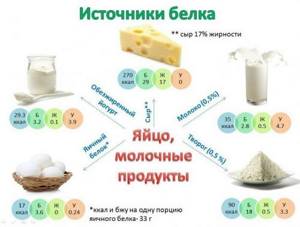
Eggs and dairy products as a source of protein
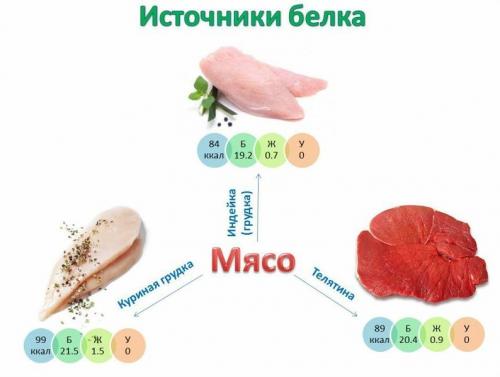
Meat (chicken breasts, veal, turkey) as a source of protein
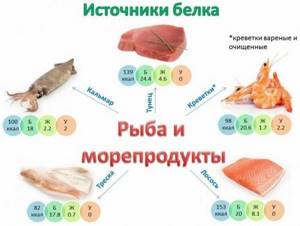
Fish and seafood as a source of protein
IMPORTANT: animal protein is much more important than plant protein.
I will say more: vegetable protein = is not taken into account at all when calculating the daily protein intake.
That is, only animal protein is considered (taken into account), vegetable protein does not count.
This is an important rule, remember it. The fact is that animal protein contains high-quality protein, which, in its amino acid profile, is more valuable in terms of obtaining nutrients from food than protein of plant origin.
Not only is plant protein low in protein, but it is also of poor quality. Understand? Actually, for this reason it is considered NOT COMPLETE (unlike animal protein).
That is, if you consume only one vegetable protein, without animal, then your muscles (which you want to pump up) will not receive enough of the necessary amino acids necessary for that very muscle growth, and as a result, all your efforts in the gym will be useless. Draw your own conclusions, I tell it like it is.

Homo sapiens, in order to grow muscles, needs a lot of protein of animal origin, because it contains the most optimal composition of amino acids necessary for the construction and renewal of muscle cells.
Training creates stress, which results in anabolic hormones triggering protein synthesis in the cell. For such a synthesis, amino acids are needed in sufficient quantity and quality... and this, as you may have already understood, is primarily a protein of animal origin...
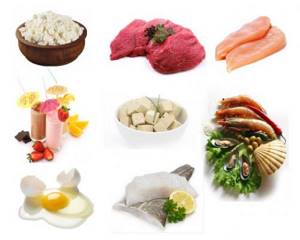
That’s why animal protein = better than plant protein, this time, and that’s why only animal protein is taken into account (counted), without plant protein (vegetable protein does not count).
However, we should not forget about vegetable protein (even though we don’t count it, it should be in the diet anyway), but in general, the ratio (only for protein) should look something like this:
80% is of animal origin, 20% is of plant origin.
Nutritional Features
We have figured out that it is not at all necessary to use store-bought protein to make up for the lack of proteins in your body. These elements can be obtained from foods that are rich in proteins. For 1 kg of weight, 1 g of protein will be enough for those people who want to lose weight by following a diet.
For example, how much protein is in a chicken egg? There is a total of 5 g of protein in an egg. It is worth noting that the protein alone contains 4 g of protein. If you mix one chicken egg with several egg whites, you can make a delicious dietary snack. The body in this case will receive 15 g of protein or more, without any additional fat.
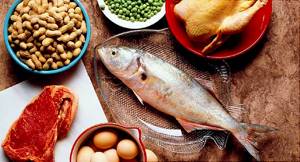
For lunch you can eat a lean piece of chicken. As for the amount of protein in chicken, a breast weighing about 115 g typically contains 26 g of protein.
Amount of protein for muscle growth
People trying to gain weight should consume a certain amount of protein per day. Protein is the main building material of muscle tissue. If the amount of protein entering the body is insufficient, then the muscles will not only stop growing, but will also be destroyed. But if the daily protein intake is exceeded, disturbances in the functioning of the liver and kidneys may occur. This is why it is so important to correctly calculate the amount of protein consumed. To gain muscle mass, you need to consume 1.5 to 2.2 g of protein per day per kilogram of body weight.
Are there limits?
Are there any restrictions regarding the amount of protein consumed? Experts strongly do not recommend consuming more than 3 g of protein per kilogram of body weight per day. The fact is that an excess of this element can lead to problems with the kidneys and liver. Therefore, protein consumption per day in the amount of 3.3 g can be justified only by the conditions of severe drying, which professional athletes resort to.



